If I’m at a restaurant and crudo is on the menu, 9 times out of 10, I’ll order it. And salmon crudo is hands-down my favorite—there’s something irresistible about its melt-in-your-mouth texture and pure, fresh flavors that just gets me. It’s also packed with health benefits, with rich quantities of omega-3 fatty acids, protein, and essential vitamins.
Until about a year ago, I was intimidated to prepare raw fish at home. I thought there was some secret that sushi chefs knew that I didn’t. But with a little research, I learned that making crudo (and sashimi, and ceviche …) is an incredibly delicious and simple at-home meal. It’s all about knowing how to buy the fish and prepare it with simple ingredients to bring out the flavor.
Today, I’ll walk you through everything you need to know to prepare raw fish at home—summer is the perfect time! Whether you’re a seasoned crudo lover or new to making raw fish dishes, this salmon crudo recipe is one to fall in love with.
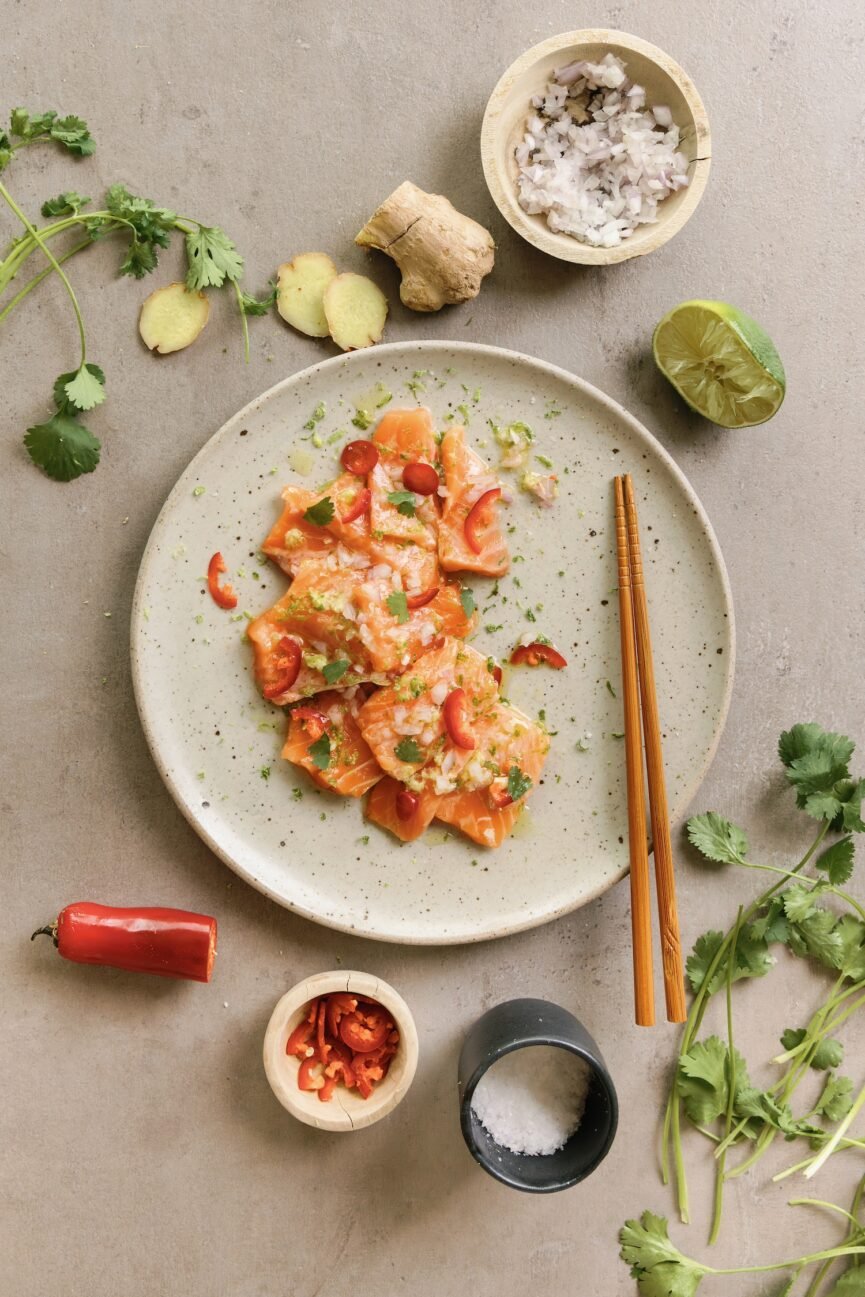
Crudo vs. Sashimi vs. Ceviche—Let’s Break It Down
If you’re wondering “what is crudo,” you’re not alone. Crudo is an Italian term that simply means “raw.” On a menu, it refers to thin slices of raw fish, often seasoned with olive oil, sea salt, citrus, and herbs. The beauty of crudo lies in its simplicity, allowing the natural flavors of the fish to shine. Crudo is a staple in Italian coastal cuisine, where it’s enjoyed as an elegant appetizer or light course.
Sashimi is the Japanese preparation of raw fish typically seasoned with soy sauce, wasabi, and pickled ginger. It’s often enjoyed as part of a larger sushi set.
Ceviche hails from Latin America (particularly Peru). Unlike crudo and sashimi, ceviche involves marinating raw fish in citrus juice, usually lime or lemon, which “cooks” the fish. This technique gives ceviche its characteristic tangy flavor and firm texture. It’s often mixed with ingredients like onions, cilantro, and chili peppers—and I usually scoop mine up with tortilla chips.
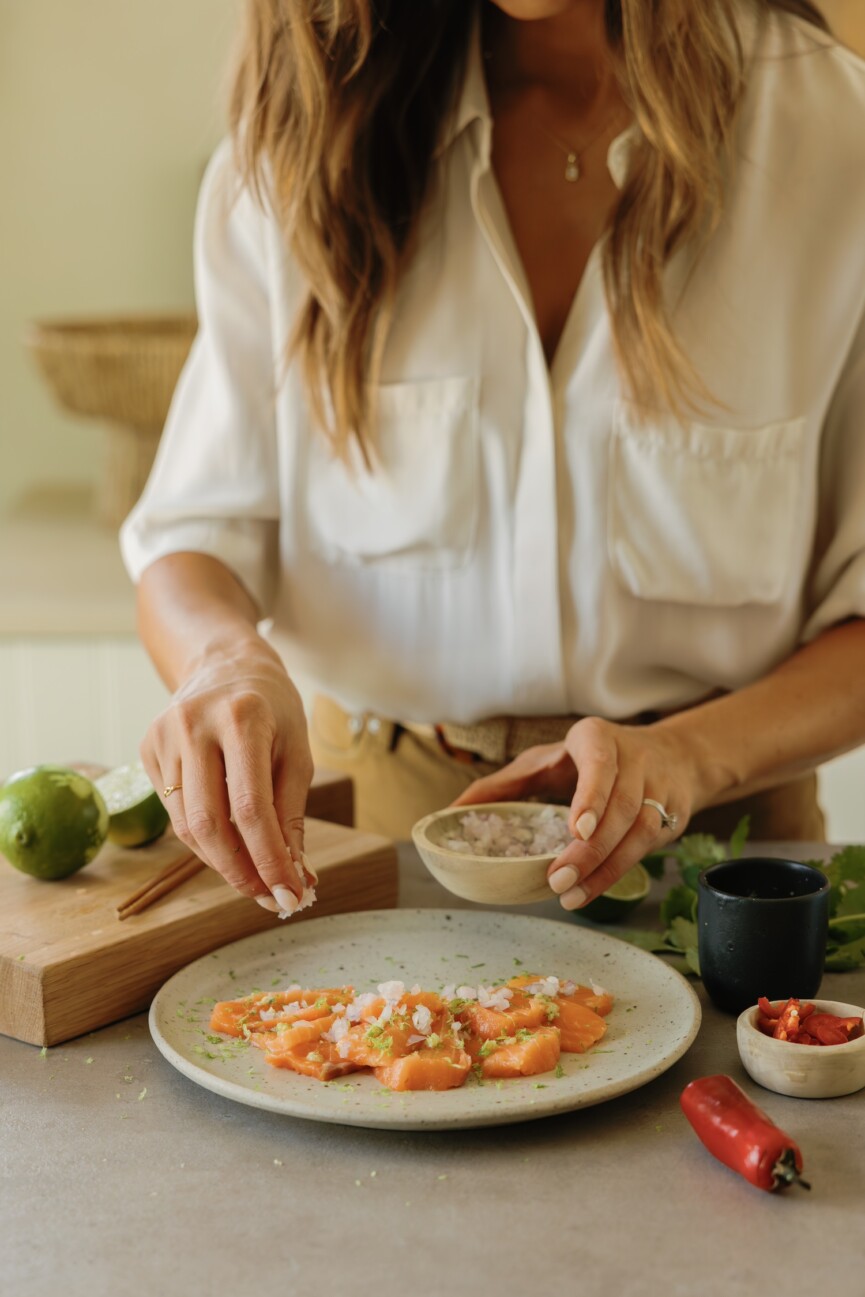
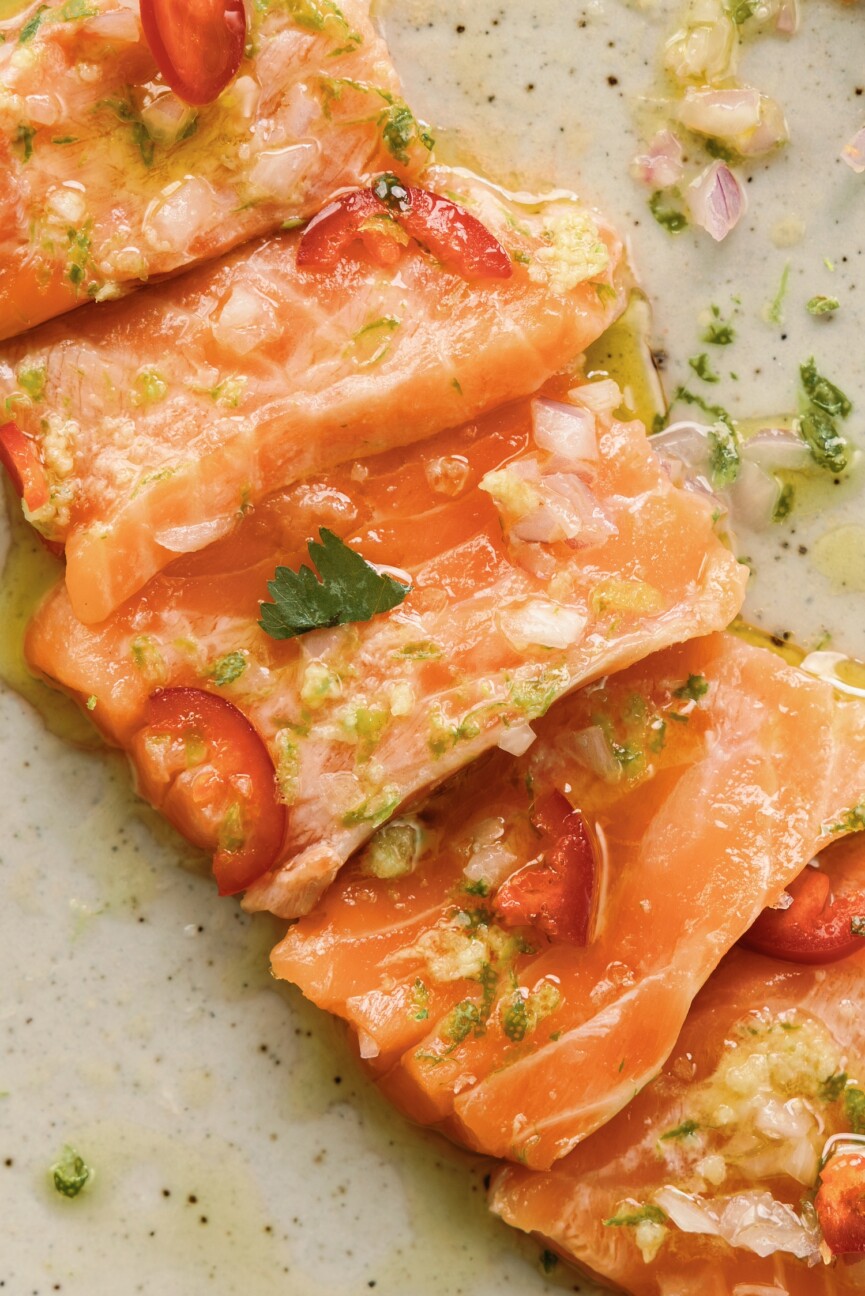
Ingredients for This Salmon Crudo
Here’s what you’ll need to make this salmon crudo recipe. When the fish is good, you only need a handful of ingredients to make it shine.
- sushi-grade salmon (tips on buying below)
- fresh ginger
- lime zest and juice
- minced shallot
- cilantro
- extra-virgin olive oil
- flaky salt like Maldon
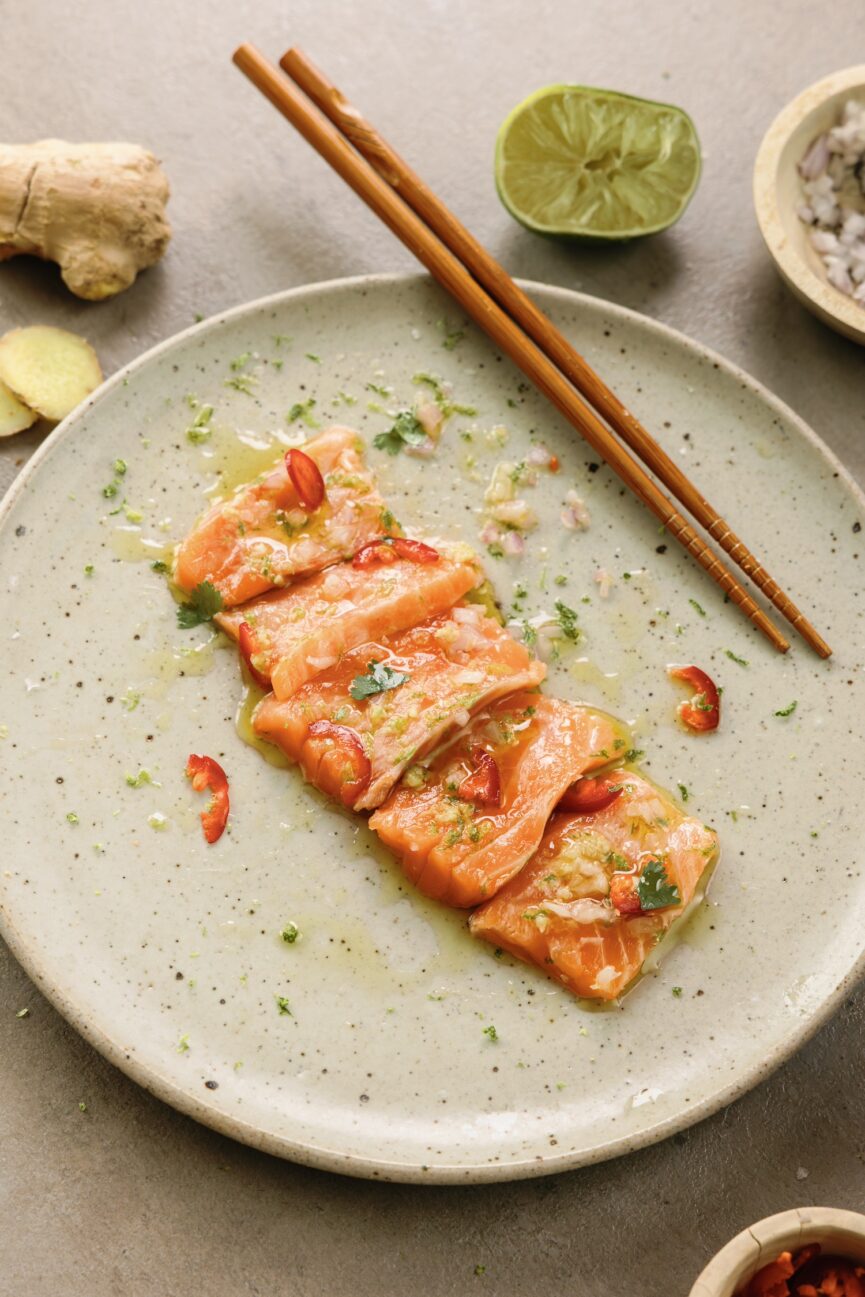
How to Buy Salmon for Raw Preparations
The question you may be asking at this point—is raw salmon safe to eat? The answer is yes, but it’s all about the quality of the fish. Here’s what to look for if you’re preparing a raw fish dish at home:
Sourcing
The first step is finding a source for the freshest and highest-quality salmon. Always buy salmon from a reputable supplier who understands your intention to consume the fish raw. Look for salmon labeled as “sushi-grade” or “sashimi-grade,” indicating that it has been handled and frozen properly to eliminate harmful parasites.
Storage and handling
Once purchased, keep the salmon cold and use it as soon as possible. Store it in the coldest part of your refrigerator and consume it within a day or two. Always keep the fish covered to prevent contamination from other foods.
Wild vs. Farm-Raised Salmon
This is really a matter of preference—despite what you may have been told, wild isn’t always better! Wild-caught salmon tends to have a firmer texture and a more pronounced, richer flavor. It’s also generally lower in fat, but it can be more expensive and less consistent.
Farm-raised salmon is usually more affordable and available year-round. It has a higher fat content, resulting in a softer texture and a milder flavor (which I prefer for this preparation). When choosing farm-raised salmon, look for responsibly farmed options, which ensure the fish is raised in environmentally sustainable conditions and without harmful chemicals.
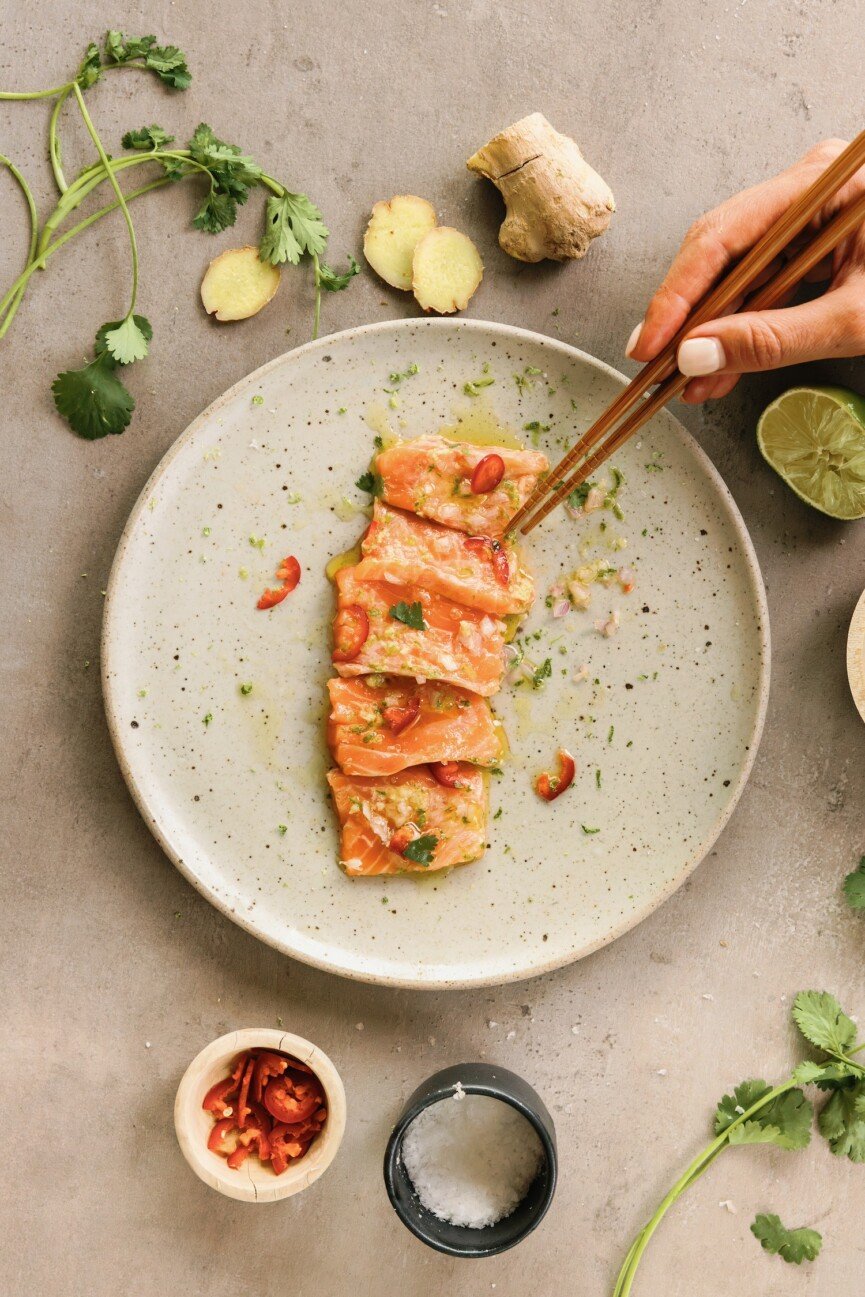
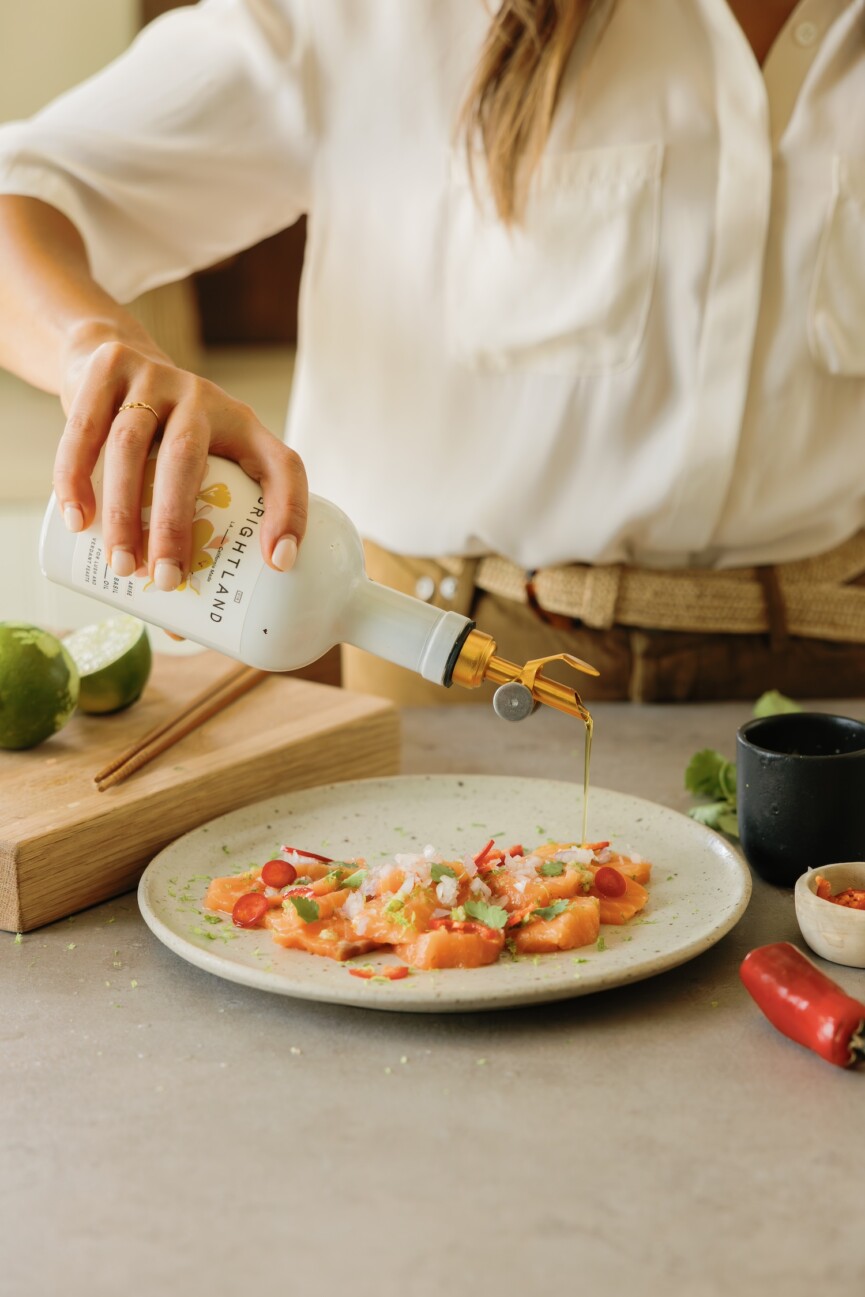
Tips for Making Great Crudo at Home
Here are a few essential tips I’ve learned the hard way, that’ll make your at-home crudo prep way more successful:
A very sharp knife
This is what will get you those beautiful, thin slices of fish. A sharp blade ensures clean cuts, preserving the delicate texture of the fish and preventing it from tearing or shredding.
Before slicing, put it in the freezer
Chilling the salmon in the freezer for about 10 minutes before slicing helps firm up the flesh, making it easier to cut thin, even slices. Be careful not to leave the fish in the freezer for too long, as you want it firm but not frozen.
How to customize
One of the joys of making salmon crudo at home is the ability to play with different flavors and seasonings, easily reinventing this dish based on your mood. Here are a few favorites:
- Seasonings: Experiment with different seasonings like cracked black pepper or chili flakes. You can also add fresh herbs like basil or mint for different herbaceous flavors.
- Citrus and Acids: While a drizzle of olive oil and a squeeze of lemon or lime juice is classic, you can also try yuzu, grapefruit, or even a splash of rice vinegar.
- Toppings and Garnishes: Make it a feast for the eyes with thinly sliced radishes, avocado, capers, or edible flowers.
- Mix up the Oils: Play with truffle oil, sesame oil, or infused olive oils to add flavor and richness.

Salmon Crudo with Ginger & Lime
 Total Time: 5 minutes
Total Time: 5 minutes Yield: 4 appetizers
Yield: 4 appetizers
Description
If you’re intimidated by prepping raw fish at home, try this simple salmon crudo recipe.
Ingredients
- 8 ounces (about 225 grams) sushi-grade salmon
- 1 teaspoon grated ginger
- 1 teaspoon grated lime zest
- 1 tablespoon minced shallot
- 2 tablespoons chopped cilantro
- 1 tablespoon (about half a lime) squeeze of lime juice
- 2 tablespoons EVOO
- flaky salt to taste
Instructions
- Using a very sharp knife, slice the salmon crosswise as thinly as possible. Arrange the slices on a serving plate.
- Top with a sprinkling of ginger, lime zest, shallot, and cilantro.
- Add a squeeze of lime juice and a drizzle of extra-virgin olive oil.
- Top each slice with a couple flakes of salt, and serve immediately.
 Prep Time: 5
Prep Time: 5
The post Crudo 101: Yes, You Really Can Make Raw Fish At Home appeared first on Camille Styles.

0 Comments